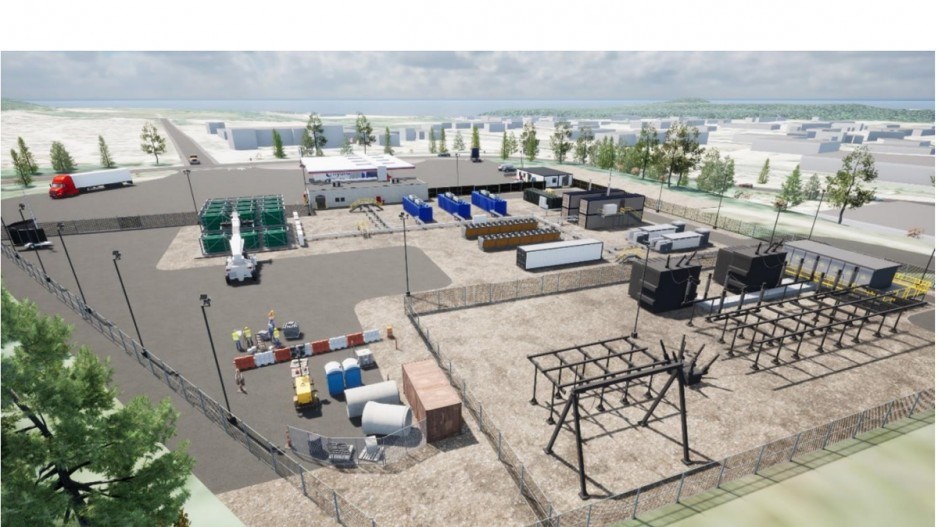There are more than four Site C dam’s worth of green hydrogen production proposals in B.C., according to a recent BC Utilities Commission (BCUC) report, which would obviously have an impact on power rates for BC Hydro customers if they were all built, since BC Hydro would need to finance a whole lot more power generation capacity.
But while the BCUC is responsible for the monopolies that provide heat and power in B.C. (BC Hydro, FortisBC Energy Inc., Pacific Northern Gas), and while hydrogen is something that can also be used for heat and power, as well as transportation, a special BCUC inquiry is recommending the BCUC take a hands-off approach to the regulation of a nascent hydrogen industry.
Unlike electricity or natural gas for heating, which are provided by utility monopolies in B.C., it’s expected hydrogen will be a free market enterprise. A BCUC panel is therefore recommending that the regulation of hydrogen be left largely up to others – namely the BC Energy Regulator (formerly the BC Oil and Gas Commission) and Technical Safety BC (TSBC).
The BCUC’s primary mandate is to regulate monopolies in B.C. -- like BC Hydro, Fortis BC and ICBC -- and protect ratepayers.
It tends not to get involved in commodities that are not produced by monopolies, like gasoline, although in 2019, the John Horgan government ordered the BCUC to do just that -- get involved in the monitoring of gasoline prices, on the suspicion that gasoline wholesalers and retailers were colluding in ways that created a kind of monopoly.
With hydrogen production and use expected to grow in B.C. in the coming years, the BCUC struck a public inquiry to determine whether providers of hydrogen services would, or should, fall within the definition of a public utility, as per the Utilities Commission Act (UCA) and, if so, to what degree it should be regulated.
In its final report, the BCUC inquiry determined that, since hydrogen can be used for “light, heat, cold or power,” hydrogen services would generally fall within the definition of a public utility, but concludes it is something that should be left largely to other regulators, such as the BC Energy Regulator and Technical Safety BC (TSBC).
“However, where it can be established that there is, or ought to be, a competitive market for these services, the BCUC has proposed exemptions from active BCUC regulation,” BCUC manager of communications Krissy Van Loon explained. “The BCUC’s proposed exemptions only apply to entities that are not otherwise public utilities.”
The inquiry panel generally recommends that the regulation hydrogen be left to other regulators.
“The panel recommends that the BCUC refrain from actively regulating the safety of Hydrogen Energy Services provided by public utilities where it is satisfied that another regulatory body is providing adequate safety oversight. The panel is satisfied that the BCER and the TSBC are tasked by legislation to provide safety oversight of Hydrogen Energy Services.”
The recommendations in the BCUC final report must be approved by the Ministry of Energy, Mines and Low Carbon Innovation.
The report offers some insights on the potential scale of a hydrogen industry in B.C., and touches on some of the infrastructure needs that might be required – including additional power generation and pipelines capable of transporting hydrogen.
The final report notes that BC Hydro is offering a special discounted electricity rate for low-carbon fuels, like green hydrogen, which is made with water and electricity (electrolysis).
“BC Hydro discussed its discounted Clean Energy Industry Innovation rate that is available to projects which produce a renewable or low carbon fuel, such as green hydrogen,” the BCUC final report notes. “As of the date of the workshop, BC Hydro has had more than 5,000 megawatts of project inquiries in the hydrogen space.”
Site C dam’s capacity is 1,100 megawatts, so if all the proposed green hydrogen projects were in fact approved, BC Hydro might need a whole lot more power than it currently expects to build.
As for pipelines, the report notes that FortisBC is working with other midstream companies on plans for using existing pipeline networks to transport hydrogen blended into natural gas.
“As it may be challenging for individual hydrogen producers to own their own pipeline networks, some parties consider bulk pipeline transportation to be better suited for existing regulated utilities like FEI (FortisBC Energy Inc.) or PNG (Pacific Northern Gas).
“In the near term, FEI would like to rely on the continued use of its existing gas pipeline infrastructure rather than duplicating its network for hydrogen. This will require repurposing of equipment to accommodate a blended hydrogen stream.
“To develop its understanding of the requirements of delivering a natural gas and hydrogen blend, FEI has partnered with PNG and Enbridge (TSX:ENB) to complete a technical feasibility study.
"All of FEI’s new pipelines are being designed to be ‘hydrogen ready’ and in accordance with the national pipeline code… which includes a new section on the transportation of hydrogen.”



